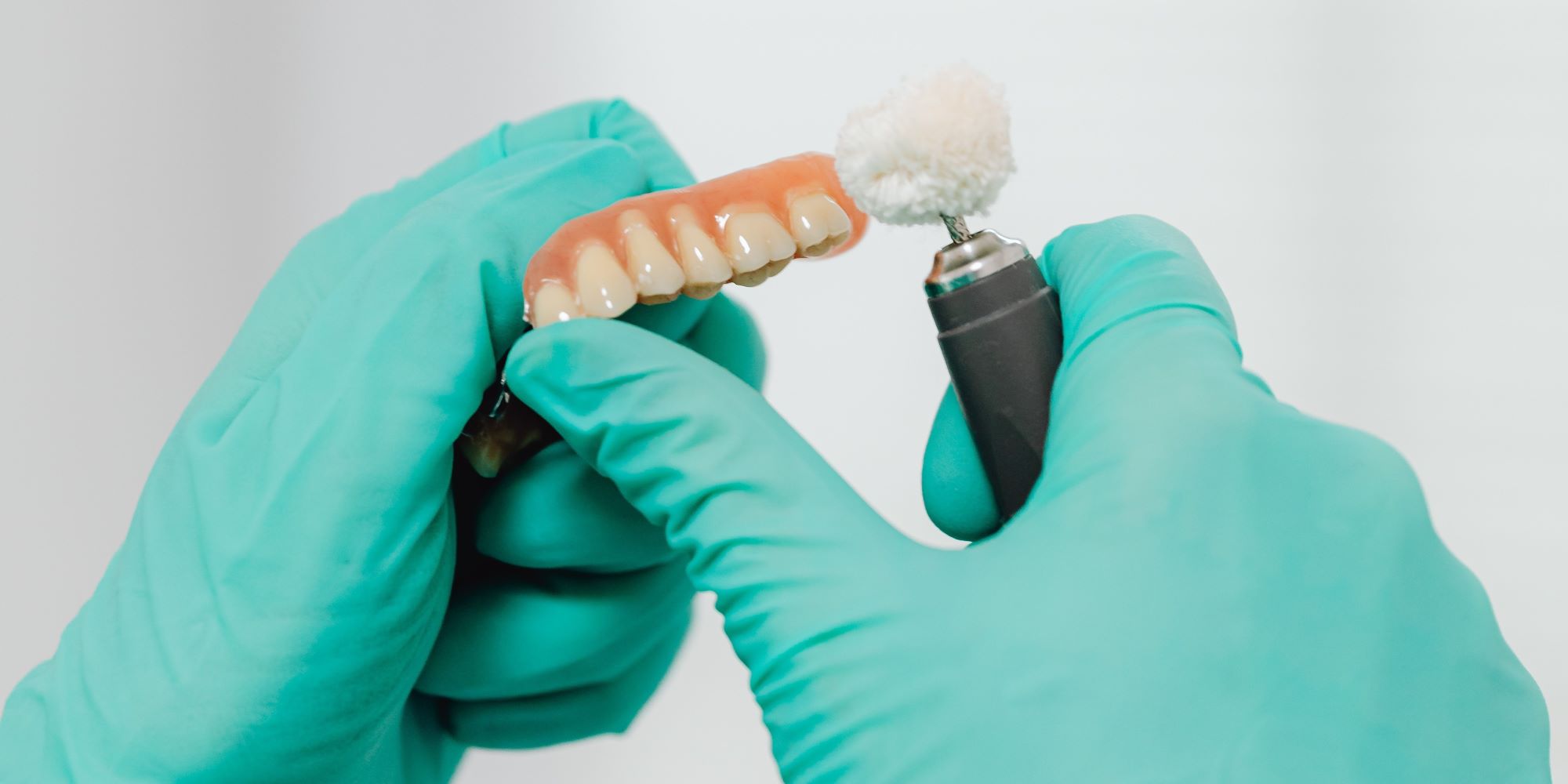
22 Apr Caring for Your Dentures 101
Dentures are delicate. This is the first lesson in caring for your removable teeth: remember that they aren’t as sturdy as the real thing. They’re not cheap, either, so getting the longest wear out of them you can is important! They need to be cared for well. Whether you’ve had dentures for years or you just received your first set, you know the difficulty of tending to false teeth. Today we’ll go back to the basics and review how you should care for your dentures to optimize their longevity and performance.
Brushing
The first category we have to address is proper brushing of your dentures. If you’re new to the whole denture thing, you may be thinking, wait—I have to brush them, too? Yes, you do. Unfortunately, the sticky film known as plaque that results from eating and drinking can build up on dentures just like on regular teeth. So just as in any other case, failure to properly brush away plaque from your dentures will leave you at risk for both gum disease and bad breath.
You need to brush your dentures at least once a day, but if you do it twice, that’s even better. Think twice before you put that toothpaste on there, though. Toothpastes often contain ingredients that are too harsh for dentures. Instead, opt for simple water or a mild denture cleanser.
When brushing false teeth, it’s important to keep in mind Rule #1: Dentures are delicate. Because of that, experts recommend folding a soft towel and placing it on the sink so that should your dentures slip from your hand, they won’t shatter. Similarly, before rinsing or brushing them, you can fill the bowl of the sink with a layer of water to act as a cushion if they do fall.
Just as with regular brushing, your job needs to be thorough enough that it removes all plaque and debris from the dentures. This is particularly relevant if you use dental adhesives. You may find that the stubborn stuff just clings on—that’s its job, after all! Brush carefully in all the grooves that adhere to your gums so as to remove every lingering bit. Finally, remember to use a soft-bristled brush, as—you guessed it—dentures are delicate.
Daily Wear and Tear
First and foremost, denture care involves removing and rinsing your dentures every day. You can use simple warm water, taking care to follow the precautions we discussed earlier such as the folded towel over the sink.
Beyond that, daytime care for your prosthetic teeth can include:
-
- Avoiding whitener and any other abrasive materials. As discussed, many chemicals are too harsh for dentures. Not only should you avoid toothpaste, you should also steer clear of whitening treatments and other potentially abrasive substances that haven’t been cleared by your dentist.
-
- Keeping them out of reach of pets.While this may seem like a no-brainer, it’s worth pointing out! Unless your false teeth are safely stored when they’re not in your mouth, you just might find your dog eating a very expensive snack.
-
- Handling carefully to avoid damage to clasps. Hopefully by now you’ve gotten the dentures-are-delicate message and know to treat your replacement teeth like the fragile objects they are. But it’s important to note that if they aren’t handled carefully, the clasps or plastics could be damaged, calling for potentially expensive repairs or even replacement.
-
- Avoiding soaking dentures in hot water. Water that is too hot will warp your dentures, causing them to lose their original shape and require fixing or replacement.
-
- Keeping track of dentures. This may also seem obvious, but losing dentures is easier than you think, with all the taking in and out and rinsing! Be careful not to misplace them in the shuffle. If they are not in your mouth, they should be in a dental appliance box.
Night Time
After removing your dentures for the night, you need to cleanse your mouth. Some people may prefer a mouthwash; others may prefer to rinse with regular water. Either method is fine. If you have any remaining natural teeth, be sure to brush and floss those. Even if you don’t, you should still brush your gums with a soft-bristled toothbrush. You can then use that toothbrush or gauze to clean your tongue and the roof of your mouth. As noted before, make sure that if you used dental adhesive, you get every last bit of it out. You don’t want any of that stickiness clinging to your gums.
What should you do once the dentures are out and your mouth is clean? Good question. Just like you wouldn’t want to dry out your contacts by leaving them out overnight, you don’t want to dry out your dentures. Soak your dentures in water or denture solution overnight. Before you put them back in in the morning, be sure to rinse them thoroughly, especially if you chose denture solution.
Final Thoughts
After all that, you might be thinking that dentures sound like a lot of work! It’s true that they do require upkeep, and you have to be careful because…dentures are delicate. But with the proper maintenance and respect for their fragility, you can have a support that helps you feel confident, happy, and secure with your smile every day.
If your dentures break, don’t try to fix them yourself. Call your dentist immediately. You should also speak to your dentist if your dentures are too loose, as that can cause irritation or infection.
If you are experiencing problems with your dentures, would like to see whether you’re a good candidate for dentures, or simply have general questions about the subject, please contact our office today.

About Our Team
Our team at Bloomingdale Dentistry has over 40 years of experience in the field of dentistry. We have a reputation of excellence in patient treatment and care.
To learn more about our team, visit our team page.
